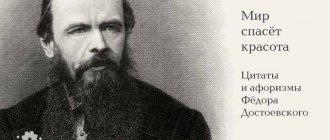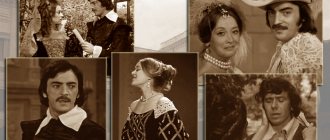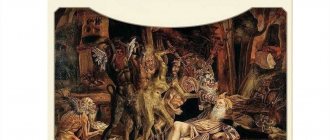October 20, 2017Literature, History
“Beauty will save the world”, “If there is no God, then everything is permitted”, “Am I a trembling creature or do I have the right”: we analyze the stories of the most common phrases of the writer and the heroes of his works
Author Anastasia Pershkina
Fedor Dostoevsky. Engraving by Vladimir Favorsky. 1929 State Tretyakov Gallery / © DIOMEDIA
"Beauty will save the world"
“Is it true, Prince [Myshkin], that you once said that the world will be saved by “beauty”? “Gentlemen,” he [Hippolytus] shouted loudly to everyone, “the prince claims that the world will be saved by beauty!” And I claim that the reason he has such playful thoughts is that he is now in love. Gentlemen, the prince is in love; Just now, as soon as he came in, I was convinced of this. Don’t blush, prince, I’ll feel sorry for you. What beauty will save the world? Kolya told me this... Are you a zealous Christian? Kolya says, you call yourself a Christian. The prince looked at him carefully and did not answer him.”
"The Idiot" (1868)
The phrase about beauty that will save the world is uttered by a minor character - the consumptive youth Hippolyte. He asks if Prince Myshkin really said that, and, having received no answer, begins to develop this thesis. But the main character of the novel does not talk about beauty in such formulations and only once asks about Nastasya Filippovna whether she is kind: “Oh, if only she were kind! Everything would be saved!”
In the context of “The Idiot,” it is customary to talk primarily about the power of inner beauty - this is exactly how the writer himself suggested interpreting this phrase. While working on the novel, he wrote to the poet and censor Apollo Maykov that he set himself the goal of creating an ideal image of “a completely wonderful person,” meaning Prince Myshkin. At the same time, in the drafts of the novel there is the following entry: “The world will be saved by beauty. Two examples of beauty,” after which the author discusses the beauty of Nastasya Filippovna. For Dostoevsky, therefore, it is important to appreciate the saving power of both the inner, spiritual beauty of a person and his appearance. In the plot of “The Idiot,” however, we find a negative answer: the beauty of Nastasya Filippovna, like the purity of Prince Myshkin, does not make the lives of other characters better and does not prevent tragedy.
Later, in the novel The Brothers Karamazov, the characters again talk about the power of beauty. Brother Mitya no longer doubts its saving power: he knows and feels that beauty can make the world a better place. But in his understanding, it also has destructive power. And the hero will suffer because he does not understand where exactly the border between good and evil lies.
Prince Myshkin: kindness and stupidity
The second most important question is: what killed Myshkin? Because the answer to it is an indicator of how beautiful a person is. It should be noted that finding the correct answer to this question is indeed not easy. In some cases, the prince's virtue borders on real stupidity.
Why do some people consider the prince stupid? Of course, not because of his ridiculous actions. The reason for this is excessive kindness and sensitivity. After all, in the end, his positive qualities became the cause of the tragedy that happened to him.
This is interesting! What does it mean to “hack on the nose” and what is the meaning of phraseology
The man tried to see only the good in everything. His beauty could even justify some of his shortcomings. Perhaps this is why he considers Nastasya Filippovna a truly beautiful person. However, many can argue with this.
“Am I a trembling creature or do I have the right”
“And it wasn’t money, the main thing, that I needed, Sonya, when I killed; It wasn’t so much the money that was needed, but something else... I know all this now... Understand me: maybe, walking the same road, I would never repeat the murder again. I needed to know something else, something else was pushing me under my arms: I needed to find out then, and find out quickly, whether I was a louse like everyone else, or a human being? Will I be able to cross or not! Do I dare to bend down and take it or not? Am I a trembling creature or do I have the right..."
"Crime and Punishment" (1866)
Raskolnikov first talks about the “trembling creature” after meeting with a tradesman who calls him a “murderer.” The hero gets scared and plunges into reasoning about how some “Napoleon” would react in his place - a representative of the highest human “class” who can calmly commit a crime for the sake of his goal or whim: “The “prophet” is right, right when places a good-sized battery somewhere across the street and blows at the right and the wrong, without even deigning to explain himself! Obey, trembling creature, and don’t desire, because it’s none of your business!..” Raskolnikov most likely borrowed this image from Pushkin’s poem “Imitations of the Koran,” where the 93rd sura is freely stated:
Take courage, despise deception, cheerfully follow the path of truth, love the orphans and preach my Koran to the trembling creature.
In the original text of the sura, the recipients of the sermon should not be “creatures,” but people who should be told about the benefits that Allah can bestow “Therefore, do not oppress the orphan! And don’t drive away the one who asks! And proclaim the mercy of your Lord” (Koran 93:9–11). Raskolnikov deliberately mixes the image from “Imitations of the Koran” and episodes from the biography of Napoleon. Of course, it was not the prophet Mohammed, but the French commander who placed “a good battery across the street.” This is how he suppressed the royalist uprising in 1795. For Raskolnikov, they are both great people, and each of them, in his opinion, had the right to achieve their goals by any means. Everything that Napoleon did could be implemented by Mohammed and any other representative of the highest “rank”.
The last mention of the “trembling creature” in “Crime and Punishment” is Raskolnikov’s same damned question “Am I a trembling creature or do I have the right...”. He utters this phrase at the end of a long explanation with Sonya Marmeladova, finally not justifying himself with noble impulses and difficult circumstances, but directly declaring that he killed for himself in order to understand what “category” he belongs to. Thus ends his last monologue; after hundreds and thousands of words, he finally got to the point. The significance of this phrase is given not only by the biting formulation, but also by what happens next to the hero. After this, Raskolnikov no longer makes long speeches: Dostoevsky leaves him only short remarks. Readers will learn about Raskolnikov’s internal experiences, which will ultimately lead him with a confession to Sennaya Square and to the police station, from the author’s explanations. The hero himself will not tell you anything more - after all, he has already asked the main question.
“I rehearsed the role of Myshkin”
After some reflection, I decided that I probably shouldn’t look for another interlocutor to talk about this topic. You have a long-standing personal relationship with Dostoevsky’s characters.
Vladimir Recipe:
My debut role at the Tashkent Gorky Theater was Rodion Raskolnikov from Crime and Punishment. Later, already in Leningrad, on the assignment of Georgy Aleksandrovich Tovstonogov, I rehearsed the role of Myshkin. She was played by Innokenty Mikhailovich Smoktunovsky in 1958. But he left the Bolshoi Drama Theater, and in the early sixties, when the play needed to be resumed for foreign tours, Tovstonogov called me into his office and said: “Volodya, we are invited to England with The Idiot.” There are a lot of inputs to be made. And we will set a condition for the British: that Myshkin be played by both Smoktunovsky and the young actor. I want it to be you! So I became a sparring partner for the actors who were being re-introduced into the play: Strzhelchik, Olkhina, Doronina, Yursky... Before the appearance of Georgy Alexandrovich and Innokenty Mikhailovich, the famous Rosa Abramovna Sirota worked with us... I was internally ready, and the role of Myshkin lives in me until so far. But Smoktunovsky arrived from filming, Tovstonogov entered the hall, and all the actors ended up on stage, but I remained on this side of the curtain. In 1970, on the Small Stage of the Bolshoi Drama Theater, I produced the play “Faces” based on Dostoevsky’s stories “Bobok” and “The Dream of a Funny Man,” where, like in “The Idiot,” it talks about beauty... Time shifts everything, changes the old style to a new one, but here’s the “rapprochement”: we are meeting on June 8, 2021. And on the same date, June 8, 1880, Fyodor Mikhailovich made his famous report on Pushkin. And yesterday I was once again interested in leafing through the volume of Dostoevsky, where “The Dream of a Funny Man,” “Bobok,” and a speech about Pushkin were gathered under one cover.
“Should the light fail, or should I not drink tea?”
“...In fact, I need, you know what: for you to fail, that’s what! I need peace of mind. Yes, I’m in favor of not being bothered, I’ll sell the whole world right now for a penny. Should the light fail, or should I not drink tea? I will say that the world is gone, but that I always drink tea. Did you know this or not? Well, I know that I am a scoundrel, a scoundrel, a selfish person, a lazy person.”
"Notes from Underground" (1864)
This is part of the monologue of the nameless hero of Notes from Underground, which he pronounces in front of a prostitute who unexpectedly came to his home. The phrase about tea sounds like evidence of the insignificance and selfishness of the underground man. These words have an interesting historical context. Tea as a measure of wealth first appears in Dostoevsky’s “Poor People.” This is how the hero of the novel, Makar Devushkin, talks about his financial situation:
“And my apartment costs me seven rubles in banknotes, and a table of five rubles: that’s twenty-four and a half, and before I paid exactly thirty, but I denied myself a lot; I didn’t always drink tea, but now I’ve saved money on tea and sugar. You know, my dear, it’s somehow a shame not to drink tea; The people here are all well-to-do, it’s a shame.”
Dostoevsky himself experienced similar experiences in his youth. In 1839, he wrote from St. Petersburg to his father in the village:
"What; Without drinking tea, you won't die of hunger! I'll live somehow! <…> The camp life of every student of a military educational institution requires at least 40 rubles. money. <…> In this amount I do not include such needs as, for example: having tea, sugar, etc. This is already necessary, and it is necessary not out of decency alone, but out of necessity. When you get wet in damp weather in the rain in a canvas tent, or in such weather, coming home from training tired, chilled, without tea you can get sick; what happened to me last year on a hike. But still, respecting your need, I will not drink tea.”
Tea in Tsarist Russia was a truly expensive product. It was transported directly from China along the only land route, and this journey took about a year. Due to transportation costs, as well as huge duties, tea in Central Russia was several times more expensive than in Europe. According to the Gazette of the St. Petersburg City Police, in 1845, in the store of Chinese teas of the merchant Piskarev, prices per pound (0.45 kilograms) of the product ranged from 5 to 6.5 rubles in banknotes, and the cost of green tea reached 50 rubles. At the same time, you could buy a pound of first-class beef for 6–7 rubles. In 1850, Otechestvennye Zapiski wrote that the annual consumption of tea in Russia was 8 million pounds - however, it is impossible to calculate how much per person, since this product was popular mainly in cities and among people of the upper class.
“If there is no God, then everything is permitted”
“... He ended with the statement that for every private person, for example, like us now, who does not believe in either God or his own immortality, the moral law of nature must immediately change in complete contrast to the previous, religious one, and that selfishness, even to the point of villainy, is not only should be allowed to a person, but even recognized as a necessary, most reasonable and almost noblest outcome in his position.”
"The Brothers Karamazov" (1880)
The most important words in Dostoevsky are usually not spoken by the main characters. Thus, Porfiry Petrovich is the first to speak about the theory of the division of humanity into two categories in Crime and Punishment, and only then Raskolnikov; Ippolit asks the question about the saving power of beauty in “The Idiot,” and the Karamazovs’ relative Pyotr Aleksandrovich Miusov notes that God and the salvation he promised are the only guarantor of people’s observance of moral laws. At the same time, Miusov refers to his brother Ivan, and only then other characters discuss this provocative theory, discussing whether Karamazov could have invented it. Brother Mitya considers her interesting, seminarian Rakitin - vile, meek Alyosha - false. But no one utters the phrase “If there is no God, then everything is permitted” in the novel. This “quote” will later be constructed from various remarks by literary critics and readers.
Five years before the publication of The Brothers Karamazov, Dostoevsky was already trying to fantasize about what humanity would do without God. The hero of the novel “The Teenager” (1875), Andrei Petrovich Versilov, argued that clear proof of the absence of a higher power and the impossibility of immortality, on the contrary, will make people love and appreciate each other more, because there is no one else to love. This unnoticed remark in the next novel grows into a theory, and that, in turn, into a test in practice. Tormented by atheistic ideas, brother Ivan compromises moral laws and allows the murder of his father. Unable to bear the consequences, he practically goes crazy. Having allowed himself everything, Ivan does not stop believing in God - his theory does not work, because he could not prove it even to himself.
Lord Byron on the splendor of beauty
For another famous, albeit foreign, writer, Lord Byron, beauty is seen as a pernicious gift. He views it as an irresistible force capable of seducing, intoxicating and committing atrocities against a person. But this is not entirely true; beauty has a dual nature. And it is better for us, people, to notice not its destructiveness and deceit, but the life-giving force that can heal our heart, mind and body. Indeed, in many ways, our health and correct perception of the picture of the world develops as a result of our direct mental attitude to things.
“Masha is lying on the table. Will I see Masha?
“April 16th. Masha is lying on the table. Will I see Masha?
To love a person as oneself, according to the commandment of Christ, is impossible. The law of personality on earth binds. I'm preventing. Christ alone could, but Christ was the eternal ideal from time to time, to which man strives and, according to the law of nature, must strive.”
From a Notebook (1864)
Masha, or Maria Dmitrievna, whose maiden name was Konstant, and by her first husband Isaev, was Dostoevsky’s first wife. They married in 1857 in the Siberian city of Kuznetsk and then moved to central Russia. On April 15, 1864, Maria Dmitrievna died of consumption. In recent years, the couple lived separately and communicated little. Maria Dmitrievna is in Vladimir, and Fyodor Mikhailovich is in St. Petersburg. He was absorbed in publishing magazines, where, among other things, he published texts by his mistress, the aspiring writer Apollinaria Suslova. The illness and death of his wife hit him hard. A few hours after her death, Dostoevsky recorded in a notebook his thoughts about love, marriage and the goals of human development. Briefly, their essence is as follows. The ideal to strive for is Christ, the only one who was able to sacrifice himself for the sake of others. Man is selfish and incapable of loving his neighbor as himself. And yet, heaven on earth is possible: with proper spiritual work, each new generation will be better than the previous one. Having reached the highest stage of development, people will refuse marriages, because they contradict the ideal of Christ. A family union is the selfish isolation of a couple, and in a world where people are ready to give up their personal interests for the sake of others, this is unnecessary and impossible. And besides, since the ideal state of humanity will be achieved only at the last stage of development, it will be possible to stop reproducing.
“Masha is lying on the table...” is an intimate diary entry, not a thoughtful writer’s manifesto. But it is in this text that ideas are outlined that Dostoevsky will later develop in his novels. A person’s selfish attachment to his “I” will be reflected in Raskolnikov’s individualistic theory, and the unattainability of the ideal - in Prince Myshkin, called “Prince Christ” in the drafts, as an example of self-sacrifice and humility.
Everyone has their own concept of beauty
Of course, beauty is understood by each individual in its own way, and each generation has its own criteria for beauty. There is nothing wrong. Everyone has long known that thanks to contradictions and disputes between people, generations and nations, only truth can be born. People by their nature are completely different in terms of their worldview and worldview. For one it is good and beautiful when he is simply neatly and fashionably dressed, for another it is bad to focus only on appearance; he prefers to develop his inner world and increase his intellectual level. Everything that somehow relates to the understanding of beauty comes from the lips of everyone, based on his personal perception of the surrounding reality. Romantic and sensual natures most often admire phenomena and objects created by nature. The freshness of the air after rain, an autumn leaf falling from the branches, the fire of a fire and a clear mountain stream - all this is a beauty that should be constantly enjoyed. For more practical natures, based on objects and phenomena of the material world, beauty can be the result, for example, of an important deal concluded or the completion of a certain series of construction works. A child will be incredibly pleased with beautiful and bright toys, a woman will be delighted with a beautiful piece of jewelry, and a man will see beauty in the new alloy wheels on his car. It seems like one word, but how many concepts, how many different perceptions!
“Constantinople – sooner or later, it must be ours”
“Pre-Petrine Russia was active and strong, although it was slowly taking shape politically; it had developed unity for itself and was preparing to consolidate its outskirts; She understood within herself that she carried within herself a treasure that was not found anywhere else - Orthodoxy, that she was the keeper of Christ's truth, but already the true truth, the real image of Christ, obscured in all other faiths and in all other peoples. <…> And this unity is not for capture, not for violence, not for the destruction of Slavic individuals in front of the Russian colossus, but in order to recreate them and put them in the proper relationship to Europe and to humanity, to finally give them the opportunity to calm down and rest after their countless centuries of suffering... <...> Of course, and for the same purpose, Constantinople - sooner or later, should be ours..."
"A Writer's Diary" (June 1876)
In 1875–1876, the Russian and foreign press were flooded with ideas about the capture of Constantinople. At this time, in the territory of the Porte, the Ottoman Porte, or Porta, is another name for the Ottoman Empire. One after another, uprisings of the Slavic peoples broke out, which the Turkish authorities brutally suppressed. Things were heading towards war. Everyone expected Russia to come out in defense of the Balkan states: it was predicted to win, and the Ottoman Empire was predicted to collapse. And, of course, everyone was worried about the question of who would get the ancient Byzantine capital in this case. Various options were discussed: that Constantinople would become an international city, that it would be occupied by the Greeks, or that it would be part of the Russian Empire. The latter option did not suit Europe at all, but it was very popular with Russian conservatives, who saw this primarily as a political benefit.
Dostoevsky was also concerned about these questions. Having entered into controversy, he immediately accused all participants in the dispute of being wrong. In the “Diary of a Writer” from the summer of 1876 to the spring of 1877, he continually returned to the Eastern Question. Unlike conservatives, he believed that Russia sincerely wants to protect fellow believers, free them from Muslim oppression, and therefore, as an Orthodox power, has the exclusive right to Constantinople. “We, Russia, are truly necessary and inevitable for all of Eastern Christianity, and for the entire fate of the future Orthodoxy on earth, for its unity,” writes Dostoevsky in his Diary for March 1877. The writer was convinced of the special Christian mission of Russia. Even earlier, he developed this idea in “The Possessed.” One of the heroes of this novel, Shatov, was convinced that the Russian people are a God-bearing people. The famous Pushkin speech, published in the “Diary of a Writer” in 1880, will be devoted to the same idea.
What then is worth living and where to draw your strength?
How to imagine a world without this enchanting beauty of every moment of life? This is simply impossible. The existence of humanity is unthinkable without this. Almost every person, engaged in everyday work or any other burdensome task, has thought more than once that in the usual bustle of life, as if carelessly, almost without noticing, he missed something very important, did not have time to notice the beauty of the moments. Yet beauty has a certain divine origin; it expresses the true essence of the Creator, giving everyone the opportunity to join Him and be like Him.
Believers comprehend beauty through communication through prayer with the Lord, through contemplation of the world He created and through the improvement of their human essence. Of course, a Christian’s understanding and vision of beauty will differ from the usual ideas of people professing another religion. But somewhere between these ideological contradictions there is still that thin thread that connects everyone into one whole. In such divine unity there also lies the silent beauty of harmony.









